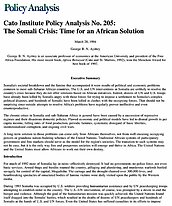Somalia’s societal breakdown and the famine that accompanied it were results of political and economic problems common to most sub-Saharan African countries. The U.S. and UN interventions in Somalia are unlikely to resolve the country’s crisis because they do not offer solutions based on African initiatives. Indeed, dozens of UN and U.S. troops have already been killed by Somalis angry with those forces for trying to impose a settlement to Somalia’s complex political disputes, and hundreds of Somalis have been killed in clashes with the occupying forces. That should not be surprising since outside attempts to resolve Africa’s problems have regularly proven ineffective and even counterproductive.
The chronic crises in Somalia and sub-Saharan Africa in general have been caused by a succession of repressive regimes and their disastrous domestic policies. Flawed economic and political models have led to dismal growth in per capita income, falling rates of food production, periodic famines, systematic disregard of basic liberties, institutionalized corruption, and ongoing civil wars.
A long-term solution to those problems can come only from Africans themselves, not from well-meaning occupying powers or grandiose nation-building schemes of the United Nations. Traditional African systems of participatory government and free markets should serve as the model for the region’s societies. The transition to such systems may not be easy, but it is the only way free and prosperous societies will emerge and thrive in Africa. The United Nations and the United States must allow Africans to work out their own destiny.
About the Author

This work is licensed under a Creative Commons Attribution-NonCommercial-ShareAlike 4.0 International License.
